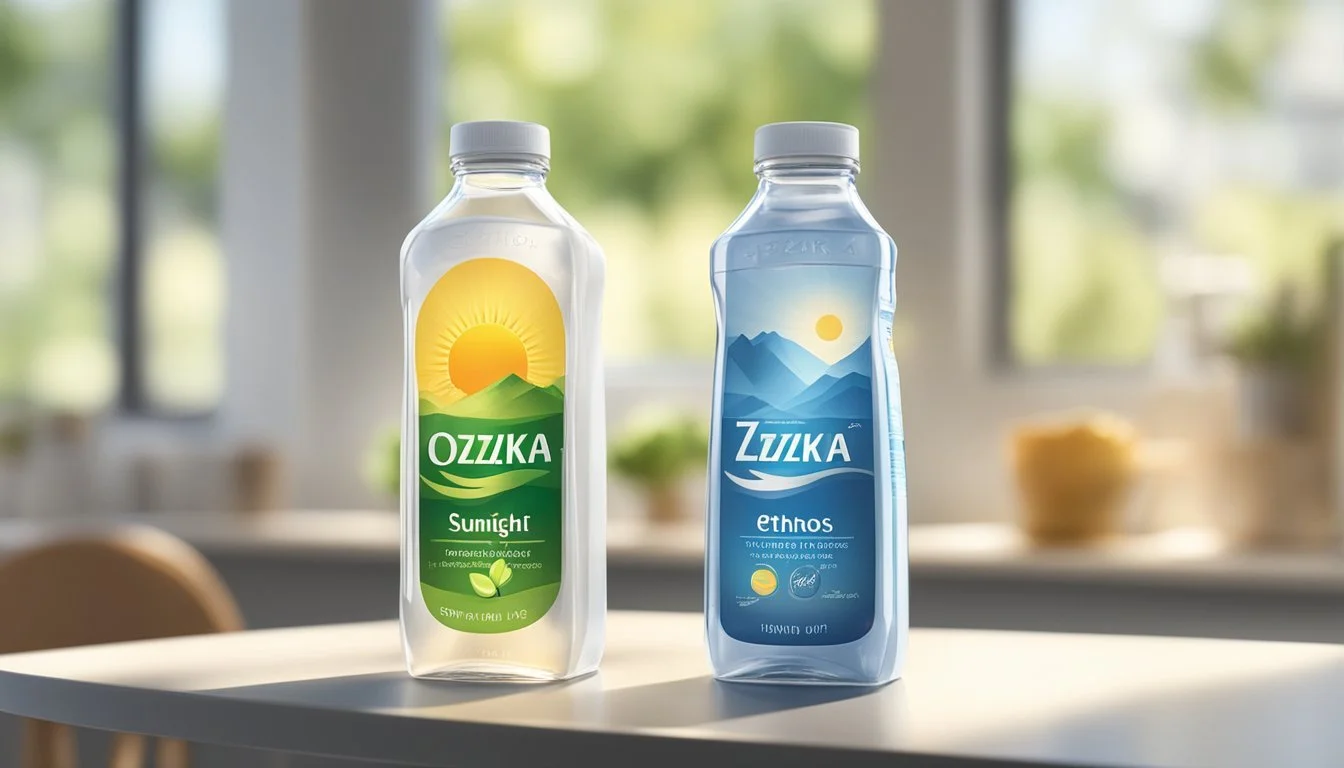Ethos vs. Ozarka
Comparing Quality and Taste in Bottled Water Brands
When consumers reach for bottled water, they are often looking for purity, taste, and convenience. Ethos and Ozarka are two brands in the crowded bottled water market that offer distinct options. Ethos Water pledges to provide crisp water while contributing to humanitarian efforts, as part of its ethical commitment, it donates to global water programs. On the other hand, Ozarka is known for sourcing its water from natural springs in Texas, promising a fresh taste that resonates with regional authenticity.
Evaluating bottled water can be complex, with factors such as source, filtration process, bottle design, and brand mission playing critical roles in consumer preference. Ethos, with its socially responsible angle, appeals to those who want their purchase to have a positive impact. Meanwhile, Ozarka might attract those who prioritize locally-sourced products with a natural origin. Taste, an entirely subjective measure, is also a crucial differentiator that influences which brand someone might consider superior.
In assessing Ethos versus Ozarka, it is important to consider both the qualitative and quantitative aspects of each product. Water quality reports, environmental impact, brand values, and consumer reviews all contribute to a comprehensive understanding of which bottled water might be deemed 'better.' However, since the term 'better' is subjective to individual values and needs, this comparison does not seek to crown a definitive winner, but rather to present the information necessary for consumers to make an informed choice based on their personal criteria for bottled water.
Ethos vs. Ozarka: Brand Overview
In comparing Ethos Water and Ozarka, two distinguished bottled water brands, it's important to consider their origins, missions, and the values they uphold.
Ethos Water: Brand History and Mission
Ethos Water began with a social responsibility mission at its core. Founded in 2002 and later acquired by Starbucks in 2005, Ethos Water has positioned itself not just as a provider of clean and safe bottled water, but as a philanthropic entity dedicated to global water access. With each bottle sold, a portion of the profits goes toward supporting water, sanitation, and hygiene education programs in water-stressed countries. Ethos Water's commitment to positively impacting the global community is a key aspect of their brand identity.
Ozarka: Brand Heritage and Values
On the other hand, Ozarka Natural Spring Water prides itself on being a regional favorite with deep Texas roots. Sourced from springs in Texas, the brand, owned by Nestlé Waters North America, reflects a heritage that dates back to 1905. Ozarka emphasizes its local origin, purity, and natural taste. The brand values creating a connection with its customer base by highlighting its regional identity and by providing a product that caters to the taste and values of the Texas community. Ozarka's dedication to its regional ties and the purity of its spring water form the foundation of its brand philosophy.
Both brands hold different appeals, with Ethos focusing on social causes and Ozarka emphasizing its regional heritage and commitment to a pure, natural product.
Source and Quality of Water
When considering bottled waters such as Ethos and Ozarka, it is crucial to assess the origin of the water and the processing methods employed to ensure quality and purity.
Aquifers and Springs: Ethos and Ozarka Sources
Ethos Water typically sources its water from private sources which may include wells or public water supplies. The source is then treated to ensure that it meets the brand's quality standards before bottling. On the other hand, Ozarka Spring Water originates from several springs in Texas, such as Roher Spring and Moffit Spring. Ozarka's spring water is drawn from naturally occurring underground formations where water flows to the Earth's surface.
Purity and Mineral Content
The purity of bottled water is gauged by its containment of contaminants and minerals. Although Ethos is treated to remove impurities, its final mineral content isn't frequently advertised or detailed on the packaging. Ozarka, sourced from springs, touts a natural blend of minerals, which is a result of water percolating through layers of sedimentary rock. These minerals include calcium, magnesium, and potassium, which can contribute to the water's taste and nutritional benefits.
Ozarka Spring Water's Mineral Content:
Calcium - Beneficial for bone health
Magnesium - Supports energy production
Potassium - Vital for muscle function
Processing Techniques
Both brands employ multiple processing techniques to ensure the safety and quality of their bottled water. Ethos Water undergoes filtration and may include reverse osmosis, where water is pushed through a semipermeable membrane to remove impurities, including heavy metals and minerals. It is also likely to be disinfected, using methods such as ozone or ultraviolet light, to eliminate microbiological contaminants.
Ozarka prides itself on using a proprietary filtration process known as Hydro-7™, which is a seven-step quality assurance process that includes careful monitoring and filtration to reduce substances found in water. Both brands have measures in place to meet the regulated standards for bottled water quality, steering clear of contaminants that can be found in groundwater sources.
Taste and Consumer Preference
In the realm of bottled water, flavor and customer satisfaction hold significant importance when comparing Ethos and Ozarka.
Flavor Profile Comparison
Ethos Water, typically offered at Starbucks locations, is often described as having a clean and neutral taste profile, likely due to its purified water status. It doesn't carry particular mineral notes, which might be expected from spring water. On the other hand, Ozarka, sourced from springs in Texas, is known to have a slightly distinct mineral flavor that varies slightly depending on the source spring. Consumers often note a fresh taste, attributing it to its natural origins.
Market Trends and Customer Reviews
The market trends indicate a split preference among consumers, largely based on regional availability and loyalty to local brands. Ozarka, being a popular brand in the Southern United States, particularly in Texas, often receives favorable reviews for its taste and regional sourcing. Ethos Water garners appreciation for its ethical commitment, with part of its profits directed towards global water initiatives. However, when focusing purely on taste, some consumers express a preference for the mineral quality of Ozarka's spring water over the more processed purity of Ethos. Consumer reviews typically highlight the following points:
Ozarka: Freshness associated with spring water, subtle mineral taste.
Ethos: Clean and neutral palate, benefitting from the purification process.
It's important to note that water taste can be subjective, and these observations are reflective of general consumer sentiment.
Health and Safety Standards
When considering bottled water options such as Ethos and Ozarka, it's crucial to examine their adherence to health and safety standards. These standards are primarily set by the FDA, with specific regulations targeting possible contaminants that can affect consumer health.
FDA Regulations and Compliance
The Food and Drug Administration (FDA) imposes strict regulations on bottled water, monitoring its safety and quality. For bottled water to be distributed across state lines, it must comply with FDA standards which are as stringent as Environmental Protection Agency (EPA) rules for tap water. These regulations ensure that bottled waters like Ethos and Ozarka do not contain levels of contaminants, such as lead, heavy metals, arsenic, BPA, and PFAS chemicals, above the allowed limits. The FDA also enforces labeling practices, where water sold as "spring," "artesian," or "purified" must meet defined criteria to avoid being misbranded.
Ethos: Must comply with FDA regulated levels for contaminants.
Ozarka: Also required to adhere to FDA regulations; although, water bottled and sold within the same state is not subject to FDA oversight.
Contaminants and Chemicals
Health risks associated with bottled water primarily revolve around the presence of contaminants or chemicals that can leach into the water from the packaging or due to inadequate purification processes. Specific contaminants of concern include:
PFAS Chemicals: Synthetic chemicals known to be resistant to breaking down in the environment and potentially harmful to health.
Lead: A heavy metal that can cause serious health problems if ingested, especially in children and pregnant women.
Heavy Metals: Besides lead, other metals like cadmium and mercury must be monitored.
BPA: An industrial chemical often found in plastic containers that can seep into water and is linked to potential health effects on the brain and prostate gland of fetuses, infants, and children.
Arsenic: A toxic element that can contaminate water through natural deposits or from agricultural and industrial practices.
Both Ethos and Ozarka are under obligation to ensure that these contaminants do not exceed safe levels:
Ethos must demonstrate consistent quality and safety, providing consumers the assurance that their water is free from harmful levels of these elements.
Ozarka, especially if sold in-state and exempt from FDA oversight, follows state-level safety standards, which vary but generally align with federal guidelines to protect public health.
Environmental Impact and Sustainability
When evaluating bottled water brands like Ethos and Ozarka, one cannot ignore their environmental impact and sustainability practices. This encompasses both the production process and the subsequent ecological footprint, from bottle creation to water sourcing.
Bottle Production and Recycling
Ethos Water comes in plastic bottles, which raise concerns regarding BPA (bisphenol A) presence and recyclability. The brand is owned by Starbucks and claims to be part of an ethical initiative to provide clean water to underprivileged areas; however, scrutiny on their bottles' environmental impact is warranted. The company has not made clear whether it uses BPA-free plastic.
Ozarka brand, on the other hand, prides itself on using bottles that are 100% recyclable and made with 50% recycled plastic. Nonetheless, the complete lifecycle of its bottles from production, transport, and after-use disposal still contributes to environmental pollution. Considering that only a fraction of recyclable bottles are actually recycled, the true sustainability of bottle production and recycling systems remains a critical topic.
Ethos Water
BPA concerns
Unclear recycling initiatives
Ozarka
Uses 100% recyclable materials
Bottles contain 50% recycled plastic
Water Extraction and Ecosystem Effects
For Ethos, while the brand contributes to social causes, the source of the water and its impact on local ecosystems hasn't been made explicit. The Environmental Working Group (EWG) emphasizes the importance of transparency regarding the source and the effects on local water tables and surrounding environments, something consumers are increasingly conscious of.
Ozarka captures water from natural springs in Texas, which may affect local ecosystems. Extractions can reduce water levels critical to habitats and species preservation. Furthermore, the impact on ecosystems isn't just local; transportation and distribution of bottled water extend the environmental footprint globally, leading to increased CO2 emissions.
Ethos Water
Source impact on ecosystems not publicly disclosed
Contributions to social causes
Ozarka
Natural spring water with potential local ecosystem impacts
Global CO2 emissions due to product transportation
Pricing, Availability, and Consumer Accessibility
When it comes to choosing between Ethos and Ozarka bottled water, consumers consider several factors including cost and ease of purchase. These two facets are critical in determining which brand offers better value and convenience to customers.
Comparative Cost Analysis
Ethos Water is often priced at a premium compared to Ozarka due to its association with social responsibility initiatives; a portion of its proceeds goes to global water programs. The typical price for a 500ml bottle of Ethos Water might range around $1.95.
In contrast, Ozarka, sourced from springs in Texas, is generally more affordable. The price for a 500ml bottle typically hovers around $1.19, making it a more economical option for consumers.
Distribution Channels and Retail Presence
Ethos Water is widely available at Starbucks locations, given that it is part of the brand’s product lineup, which bolsters its accessibility for Starbucks customers. Additionally, Ethos is distributed in various upscale markets and health food stores.
Ozarka has a broad retail presence across the Southern United States, particularly in Texas, Louisiana, and Arkansas. It is commonly found in a range of stores from supermarkets to convenience shops, making it widely accessible to consumers.
Both brands leverage online platforms and various retailers for distribution, though Ethos is typically found in more specialized outlets reflecting its premium branding, while Ozarka's widespread availability aligns with its positioning as a daily staple.
Final Verdict: Ethos vs. Ozarka
When deciding between Ethos and Ozarka bottled water, consumers often weigh factors such as taste, source, and corporate practices. Ethos Water prides itself on being more than just a water brand—for every bottle purchased, a portion of the profits is donated to support water programs in underprivileged communities. This philanthropic angle presents a compelling choice for socially conscious consumers.
Ozarka Natural Spring Water, on the other hand, has a loyal following due to its regional sourcing. Water is collected from springs in Texas, which is said to provide a distinct taste that resonates with local preferences. Despite past disputes over naming rights, as indicated by a legal battle referenced in a search result, Ozarka's commitment to regional identity remains firm.
In terms of taste, the preference is subjective, but it can be noted that Ethos is often criticized for being overpriced given that it sources its water from the public water supply and refines it. Ozarka, sourced from natural springs, may offer a taste that some consumers prefer due to its natural mineral content.
Aspect Ethos Water Ozarka Natural Spring Water Source Public water supply, refined Texas natural springs Taste Clean, consistent Natural, potentially varies by source Corporate Ethics Donations for water programs Emphasizes regional identity
Each brand has its merits. Ethos appeals to those who want to make a positive impact with their purchase, while Ozarka might be the preferred choice for those who value natural spring water and regional loyalty.






